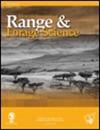Transhumance pastoralism in West Africa – its importance, policies and challenges
IF 1.9
4区 环境科学与生态学
Q3 ECOLOGY
引用次数: 4
Abstract
The Economic Community of West African States (ECOWAS) recognises transhumance pastoralism as a beneficial livestock production system that can contribute to food security together with economic and political stability. Thus, the subregional bloc put together the ECOWAS Protocol on Transhumance and supporting regulations to actualise these benefits. These policies seek to regulate transhumance pastoralism by ensuring that herd movements are along defined migratory corridors among member states. This review assesses the importance of transhumance pastoralism in West Africa, local and cross-border policies, and associated challenges, with emphasis on herder–farmer conflicts. It was realised that the movement of large numbers of livestock into rangelands (1) provides employment for many, and thus improves livelihoods; (2) improves productivity through high milk production and high fertility; (3) reduces moribund and combustible forage materials in the dry season; and (4) enhances seed dispersal, soil fertility and plant diversity on rangelands. This review shows that the ECOWAS cross-border transhumance protocols have led to infrastructural developments in some member states, but the partial enforcement of protocols has led to herder–farmer conflicts. We conclude that transhumance pastoralism and the regulatory policies have several benefits. However, to ensure policy compliance and avoid herder–farmer conflicts, the policies need to be reviewed and discernible gaps eliminated.西非的超畜牧业——其重要性、政策和挑战
西非国家经济共同体(西非经共体)认识到,过渡放牧是一种有益的畜牧生产系统,可以促进粮食安全以及经济和政治稳定。因此,次区域集团制订了西非经共体关于移民的议定书和支助条例,以实现这些利益。这些政策试图通过确保牧群沿着成员国之间确定的迁徙走廊移动来规范跨放牧。本综述评估了西非跨放牧畜牧业的重要性、地方和跨境政策以及相关挑战,重点是牧民与农民之间的冲突。人们意识到,大量牲畜进入牧场(1)为许多人提供了就业机会,从而改善了生计;(2)通过高产奶量和高肥力提高生产力;(3)减少枯死和可燃牧草在旱季;(4)增强了放牧区的种子传播、土壤肥力和植物多样性。这一审查表明,西非经共体的跨境迁移协议促进了一些成员国的基础设施发展,但协议的部分执行导致了牧民与农民的冲突。我们的结论是,越牧畜牧业和监管政策有几个好处。然而,为了确保政策合规并避免牧民与农民之间的冲突,需要对政策进行审查,并消除明显的差距。
本文章由计算机程序翻译,如有差异,请以英文原文为准。
求助全文
约1分钟内获得全文
求助全文
来源期刊

African Journal of Range & Forage Science
ECOLOGY-ENVIRONMENTAL SCIENCES
CiteScore
4.00
自引率
14.30%
发文量
35
审稿时长
>12 weeks
期刊介绍:
The African Journal of Range & Forage Science is the leading rangeland and pastoral journal in Africa. The Journal is dedicated to publishing quality original material that advances rangeland ecology and pasture management. The journal aims to publish research of international importance from any region, but as an African journal, we are particularly interested in research from Africa and relevant to the continent. The Journal promotes both science and its application and authors are encouraged to explicitly identify the practical implications of their work. Peer-reviewed research papers and research notes deal primarily with all aspects of rangeland and pasture ecology and management, including the ecophysiology and biogeochemistry of rangelands and pastures, terrestrial plant–herbivore interactions (both domestic and wild), rangeland assessment and monitoring, effects of climate change on rangelands, rangeland and pasture management, rangeland rehabilitation, ecosystem services in support of production, conservation and biodiversity goals, and the identification and development of intensive and semi-intensive pasture and forage resources to meet livestock production needs. Articles highlighting transdisciplinary linkages among biophysical and social sciences that support management, policy and societal values are particularly encouraged. The Journal includes relevant book reviews and invited perspectives that contribute to the development of range and forage science. Letters to the editor that debate issues raised in the Journal are acceptable. The African Journal of Range & Forage Science is the official journal of the Grassland Society of Southern Africa.
 求助内容:
求助内容: 应助结果提醒方式:
应助结果提醒方式:


